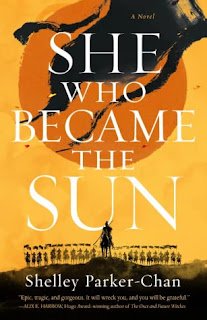She Who Became the Sun
Synopsis
Mulan meets The Song of Achilles in Shelley Parker-Chan's She Who Became the Sun, a bold, queer, and lyrical reimagining of the rise of the founding emperor of the Ming Dynasty from an amazing new voice in literary fantasy.
To possess the Mandate of Heaven, the female monk Zhu will do anything
“I refuse to be nothing…”
In a famine-stricken village on a dusty yellow plain, two children are given two fates. A boy, greatness. A girl, nothingness…
In 1345, China lies under harsh Mongol rule. For the starving peasants of the Central Plains, greatness is something found only in stories. When the Zhu family’s eighth-born son, Zhu Chongba, is given a fate of greatness, everyone is mystified as to how it will come to pass. The fate of nothingness received by the family’s clever and capable second daughter, on the other hand, is only as expected.
When a bandit attack orphans the two children, though, it is Zhu Chongba who succumbs to despair and dies. Desperate to escape her own fated death, the girl uses her brother's identity to enter a monastery as a young male novice. There, propelled by her burning desire to survive, Zhu learns she is capable of doing whatever it takes, no matter how callous, to stay hidden from her fate.
After her sanctuary is destroyed for supporting the rebellion against Mongol rule, Zhu takes the chance to claim another future altogether: her brother's abandoned greatness.
Review
When a peasant-born person believes in their fate for greatness, there will be no limit to what they can achieve.
I received a free copy from Netgalley in exchange for an honest review.
The Zhu family are starving peasants, but they have something to pride - Zhu Chongba is the eighth son of the eighth son, he is destined for a life of luck and greatness.
After an attack by bandits, Chongba loses the will to live, and fades into nothing. His younger sister, a nameless, worthless girl, decides to take on his name and his fate, because she has the stubborn will to achieve it.
She joins a monastery, and is raised as a man, until her home is attacked by the Mongols who rule China.
Zhu is the only known survivor, and makes her way to the Red Turbans, a peasant rebellion that follows the Prince of Radiance (a child who is one of the great chinese emperors reborn).
It was interesting to read about young Zhu, her life in the village, where only boys were worth feeding. And everything she had to do to hide the gender she was born with at the monastery.
But it took a while to truly click with the book.
I think this happened when I realised that Zhu is NOT a hero. She's not doing this to save her family, or loved ones; she's not being noble. Zhu is not doing this for the Emperor, or to please Heaven. She is doing it because she wants greatness for herself, and she is willing to do whatever it takes to get it.
There are some very dark moments, with questionable morals throughout the book, but I didn't think Zhu was a full-on anti-hero, she sees the flaws in other ambitious people, and attempts to reduce them in herself.
She is lacking in all softness and femininity, either because she has spent so long removing every trace of what does not belong to Zhu Chonga; or because she never had them in the first place. Zhu does recognize this weakness, and tries to find some balance... as long as it doesn't affect her grand plans.
The narrative is shared with Ouyang - the Mongol's eunuch general.
Ouyang is Chinese, his family killed by the people he now serves. As a young boy, he was castrated, but left alive, to suffer his humiliation forever.
Ouyang's story seemed quite straight-forward at first - he'd been elevated from slave to General by Prince Esen, the only person Ouyang has ever cared for. His duty is to his lord, and he is a cunning man who has earnt his place on the battlefield...
Except, Esen doesn't see the pain that Ouyang is still in, he doesn't see that his friend is still affected by the death of his family.
There's plenty of action in this epic story, but my favourite elements are the politics and the cunning shown by both Ouyang and Zhu.
Their fates are interwoven, and there is a certain recognition, as like can see like.
I was hooked to see who would come out on top, and what hidden plans they had. In the end, both remained ruthless, which was kind of a relief in a weird way.
I really liked how this story explored gender identity. Both main characters are non-binary, but with very different approaches. Zhu naturally relates more to being male, but refers to herself as 'she'; and poor Ouyang had this forced upon him, fueling his anger.
The book also views the role of women in this era, who are bound by duty to serve men as wives and concubines. The intelligent ones have to hide their influence.
Overall, I really enjoyed this debut, and I look forward to where the series goes.




Comments
Post a Comment